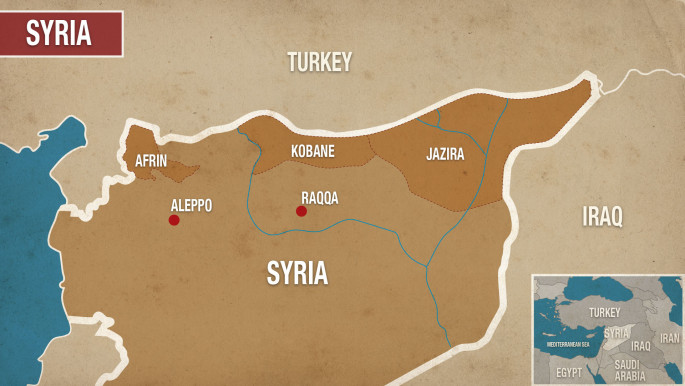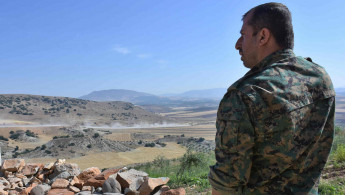Turkey is targeting Afrin to send a message to Syria's Kurds
Turkish President Recep Tayyip Erdogan said on Saturday that Turkey was preparing for imminent cross-border operations in northern Syria. Given the fact that the Islamic State group has been pushed from the border, this indicates that Turkey plans to step up its attacks on Afrin.
Ankara has been sending powerful 55mm T-155 Firtina artillery guns to the Kilis frontier province, within firing range of Afrin.
On July 16, Turkish artillery targeted Afrin in what the Syrian Observatory for Human Rights estimates was "considered the first targeting of the city since the start of Turkish preparations" to attack the region on June 20.
The Kurdish city is the capital of a tiny enclave that had a pre-war population of 170,000, according to the 2004 census. It is likely home to many more today, given the influx of displaced Syrians from the Aleppo region. It's the smallest of the three Syrian Kurdish territories.
The other two, Kobane and Jazira, are east of the Euphrates River.
Following the link-up of Kobane and Jazira, after a major summer 2015 offensive against IS in Tal Abyad, the Syrian Kurdish Democratic Union Party (PYD) and its armed wing, the People's Protection Units (YPG), controlled territory spanning approximately three-quarters of Syria's frontier with Turkey.
Turkish forces and their Free Syrian Army proxy fighters currently fill the gap, holding the 60-mile border territory separating Kobane from Afrin after capturing it from Islamic State fighters during the Euphrates Shield campaign, launched in late August and formally concluded at the end of March.
Ankara has fought an ongoing four-decade war against Kurdish insurgents in the Kurdistan Workers' Party (PKK) - an armed militant group largely based in Turkey's south-east. The PKK has claimed responsibility for dozens of attacks on Turkish troops over the years, and has been blamed for further attacks on civilians, in a bid to carve out an autonomous Kurdish territory.
Turkey is therefore extremely wary of allowing a heavily armed Kurdish statelet to emerge just across its border in northern Syria. Any federalisation of Syria into ethnic-based autonomous areas is also strongly opposed by Syria's political opposition in exile.
 |
Presently the Turks are focusing on the isolated Afrin canton, which they have nearly surrounded |  |
But Ankara has failed to convince Washington to relinquish its support of the YPG, a major group within the Syrian Democratic Forces (SDF) Arab-Kurdish coalition, in the Raqqa campaign against IS, and to instead partner with the Turkish military to capture the city.
The US has instead established a network of airfields in the northeastern Syrian Kurdish territories - the precise location of which Turkey publicly divulged - to support the SDF campaign against IS in Raqqa. Ankara, meanwhile, bombed the YPG in that same region in late April and threatened to launch future attacks without warning.
Presently the Turks are focusing on the isolated Afrin canton, which they have nearly surrounded - Turkey is to the west and north, and Turkish-held Syrian territory is to its immediate east.
| Feature continues below map |
 |
Turkey also expressed its aim to send soldiers into the Idlib province - part of one of the so-called de-escalation zones it negotiated with Iran and Russia - which is to Afrin's south. Ankara's FSA allies reportedly forced YPG troops operating from Afrin to retreat from a village near the canton last month by firing artillery and mortars at their positions.
Over the weekend, the YPG released video purporting to show them taking out an FSA tank with a missile near Azaz, east of Afrin and also on the Turkish border. On August 3, another video appeared to show their forces firing BM-21 Grad rockets at these Turkish-backed forces, also reportedly near Azaz.
While Turkey appeared geared up in June to launch a large-scale cross-border operation into Afrin, that hasn't yet happened. Nevertheless, the YPG has reported almost daily cross-border bombardments against their positions there.
While Afrin is small and isolated, it is protected by battle-hardened YPG forces, who captured the town of Tel Rifaat and the Menagh airfield to the enclave's east in a successful offensive in February 2016. Turkey seeks, through supporting artillery strikes and FSA offensives, to push the YPG back from these areas and neutralise it inside Afrin itself.
They might manage to achieve this, but it's unclear if they'll risk outright invading Afrin any time soon, given the heavy casualties they could potentially incur in a ground war there.
 |
It's unclear if these fighters will fare much better against the Afrin-based YPG - who would most certainly fight to the death from well-entrenched positions with their backs to the wall |  |
Turkey's heavy reliance on FSA fighters in its Euphrates Shield operation exposed the limitations of those fighters' capabilities. Despite support from Turkish artillery and airstrikes, armour and special forces, the FSA took heavy casualties - an estimated total of 600 FSA fighters were killed. During the siege of IS in the city of Al-Bab, where the most ferocious fighting of the campaign took place, Turkey had to send in more of its own troops and eventually had as many troops on that battlefield as FSA militiamen.
Read more: What does the future hold for Syria's Kurds?
Turkey has partially sought to rectify these shortcomings by training what it calls a new FSA force for future operations.
"It's no longer the old FSA in the field but a new FSA being born," a Turkish military official told Anadolu in May. "These FSA members in training will show their differences in possible future operations."
This training reportedly includes operating mortars, machine guns and rocket launchers.
It's unclear if these fighters will fare much better against the Afrin-based YPG - who would most certainly fight to the death from well-entrenched positions with their backs to the wall.
Furthermore, there is some evidence of division within the Syrian FSA proxy force Turkey assembled. In June in Al-Bab the fighters started shooting each other, leaving "several dead and scores injured".
Turkey also disarmed another group within the FSA, the Liwa Ahfad Salahaddin, and detained its leader for three weeks.
"Even though we opposed the YPG and the Kurdistan Workers Party, Turkey took our weapons after Euphrates Shield formally ended," the group's chief commander, Mahmud Khallo, told Middle East Eye last month.
A Turkish invasion of Afrin would also doubtlessly require a sizable infantry force. Turkish armour, especially the older American-made M60 Patton tanks, proved highly vulnerable to anti-tank fire during Euphrates Shield. Turkey also lost an estimated 67 soldiers throughout that campaign - which, aside from the Al-Bab battle, was mostly fought in small villages.
A costly operation for the Turkish military in Afrin could also make the Turkish military look weak, given their superior numbers of troops and the advantageous positions they have over the tiny isolated canton. The loss of 100 Turkish soldiers would certainly prove more politically damaging to Ankara than the loss of 1,000 FSA fighters.
Consequently, Ankara will likely settle for the equivalent of shooting fish in a barrel: hence heavy artillery bombardments carried out in tandem with a total blockade of Afrin.
Paul Iddon is a freelance journalist based in Erbil, Iraqi Kurdistan, who writes about Middle East affairs.
Follow him on Twitter: @pauliddon



